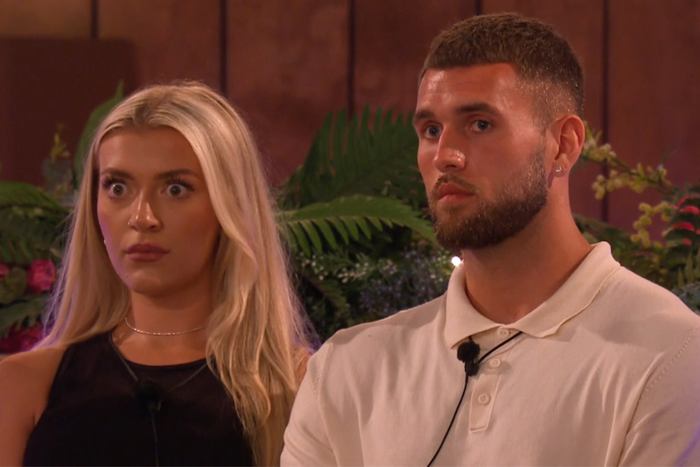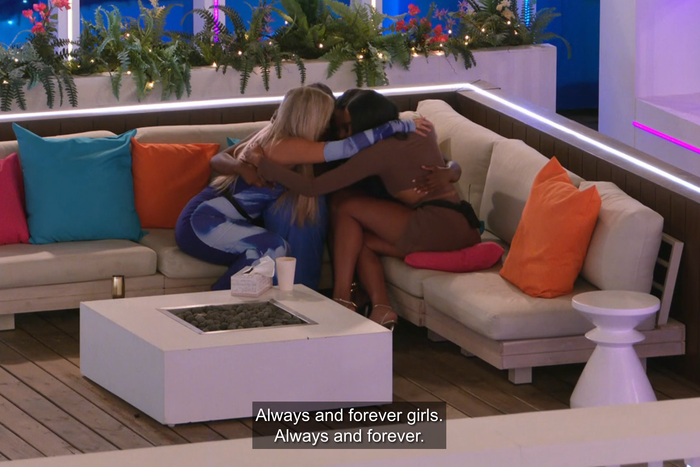
Warning: Spoilers for current and previous seasons of Love Island U.K.
You know how relationships hit a rut around the seven-year mark? Complacency sets in, people get lazy, and the excitement just isn’t there anymore. That’s how longtime viewers were feeling about Love Island U.K. in the wake of tired, predictable recent seasons that lacked the passion and volatility of the series’ honeymoon period. Declining viewership and widespread audience complaints poured in like friends giving “dump him” advice. After yet another season of unsurprising narratives and derivative twists, season ten was poised to be Love Island’s shot at redemption — and boy, has it delivered so far. This season provides exactly what longtime viewers crave: unpredictable mess from a cast that’s a joy to watch.
Fans have noticed the series struggling to regain its footing since the widely lauded fifth season. During that era, the show’s signature elements, such as Casa Amor and the tweet challenge, still carried stakes, and hilarious and memorable cast members made even slower episodes enjoyable. Then, at its peak, the show introduced an ill-fated winter edition for the sixth season, filmed in South Africa and a few weeks shorter but otherwise indistinguishable from the summer edition. Winter seasons contributed to viewer fatigue and accelerated the process of participants catching on to “winning” strategies and mimicking story lines they’d seen play out successfully in past seasons: Couples who got together early and overcame a series of “tests” only to end up back together were a shoo-in for the final. There’s no better example of this than season seven, arguably the series’ low point, in which Liam Reardon and Millie Court took the crown at the end of an unrewarding season filled with predictable plotlines and producer-fueled toxicity that generated record-breaking reports to Ofcom, the U.K.’s broadcast regulating body. More recent seasons have seen winners who broke the mold, such as Ekin-Su Cülcüloğlu and Davide Sanclimenti (season eight) and Kai Fagan and Sanam Harrinanan (season nine) in what appears to be pushback by viewers against manufactured, producer-led narratives. But if there ever was a playbook, it seems to have been tossed into the Balearic Sea at the start of season ten.
As with any reality show, Love Island’s success depends on the cast’s chemistry: equal parts compatible and disagreeable, relatable and aspirational, likable and controversial. And above all, compelling to watch. Season ten has no shortage of breakout personalities. Whitney Adebayo serves quick-witted one-liners and comic relief to tension-packed episodes. Mitchel Taylor created a bonkers plot line out of thin air when he “saved” his initial love interest, Molly Marsh, from being dumped, ostensibly for “friendship” (Molly was interested in Mitch’s friend, Zachariah), only to later confess his true motivation was to secretly further his relationship with Molly. Mehdi Edno and Sammy Root are disingenuous villains who give viewers a target to hurl time-honored “game-playing” accusations against. Even season two’s Kady McDermott, returning for her second stint in the famed villa at the old-maidish age of 27, isn’t too seasoned to dip her toes in a little drama. Adebayo, Catherine Agbaje, and Ella Thomas have formed a wholesome trio that is fun to root for after many seasons of familiar-looking (white) main characters.
But even with a talented cast, predictability could still lead to a lack of excitement and engagement. Casa Amor, a jarring surprise from season three, has lost its novelty as islanders now expect the challenge and know what kind of behavior plays well. The show works best when producers throw the islanders off their game plan and into compromising social situations, but a lack of innovation in recent seasons gave more experienced cast members an advantage in avoiding elimination — a terrible recipe for drama.
Luckily, this season’s production seems eager to shake up the format and undermine the original islanders’ sense of safety. The series has seen five original cast members eliminated since the season started, a notable uptick from the two to three OGs that are typically dropped by this point in more recent seasons. Most surprising was Molly Marsh’s elimination. Marsh was in one of the strongest couples, or so she thought, until she was unexpectedly dumped on McDermott’s arrival. In yet another new twist, Marsh recently returned to the villa as a Casa Amor bombshell, where she’s reinserted herself into the love triangle that eliminated her in the first place. In another Casa Amor surprise, model Ouzy See was evidently planted for Ella—the two had previously met and intended to date just before they were respectively cast. This stunt threw a spanner in the works for what had been the strongest couple in the villa thus far (Ella and fellow original islander Tyrique Hyde).
Moreover, challenges in which islanders are forced to share their honest opinions create tension among the cast and lead to drama. For instance, after losing a compatibility vote in week three, Jess Harding and Sammy Root are split and forbidden from recoupling at the next opportunity. An innocent-seeming “situationship” challenge forced contestants to reveal compromising opinions, like why they believe Mitch to be untrustworthy for his stunt with Molly, or who thinks Molly and Zach are playing a game (spoiler: it’s nearly everyone). Creative new games like this that are designed to stoke tensions rather than just fill air time or make us queasy, combined with familiar favorites like the heart-race challenge and movie night, are effectively fueling tensions among the cast and planting seeds for later blowouts.
These production shakeups are resulting in a season for the books, even rivaling the now-iconic season five. The editing team has even abandoned the use of cliffhangers, relying on consistent drama and compelling plotlines to keep viewers tuning in night after night, no small feat for a series which requires a daily commitment and averages 50-plus hourlong episodes per season. This season proves the show can recapture its original spark by not leaning on old tricks. The show tends to lose momentum on the other side of Casa Amor as the season winds down, but maybe with the playbook out the window, this fresh, exciting energy will last until the finale. (A finale in which there is mercifully no telling who will appear, let alone who might win.) What else can be said about this season? It’s giving comeback!




